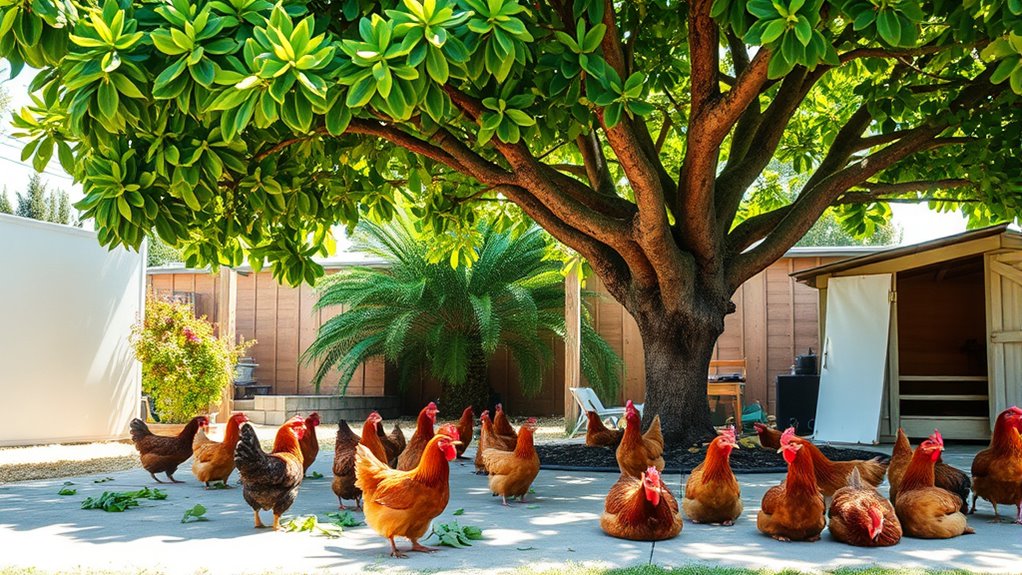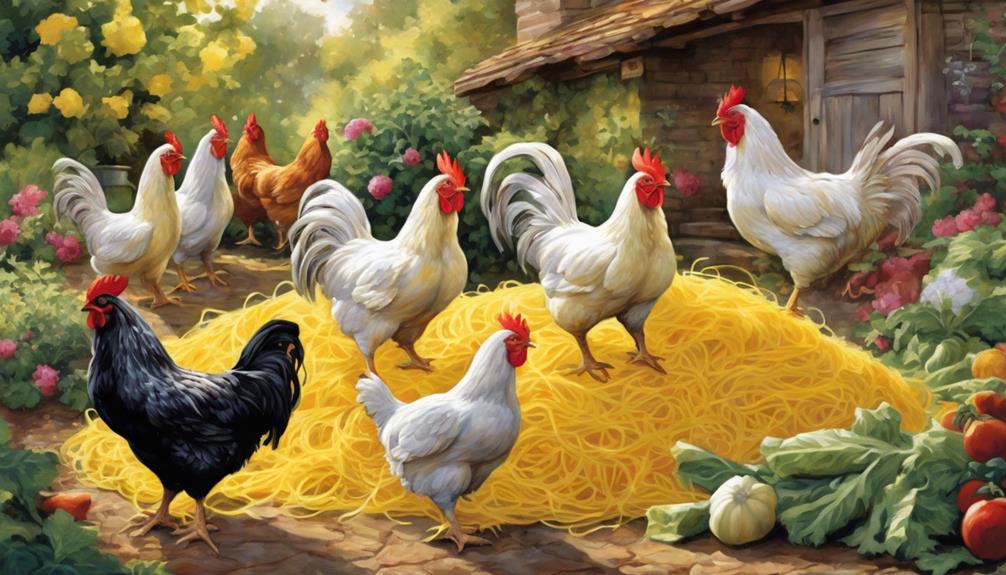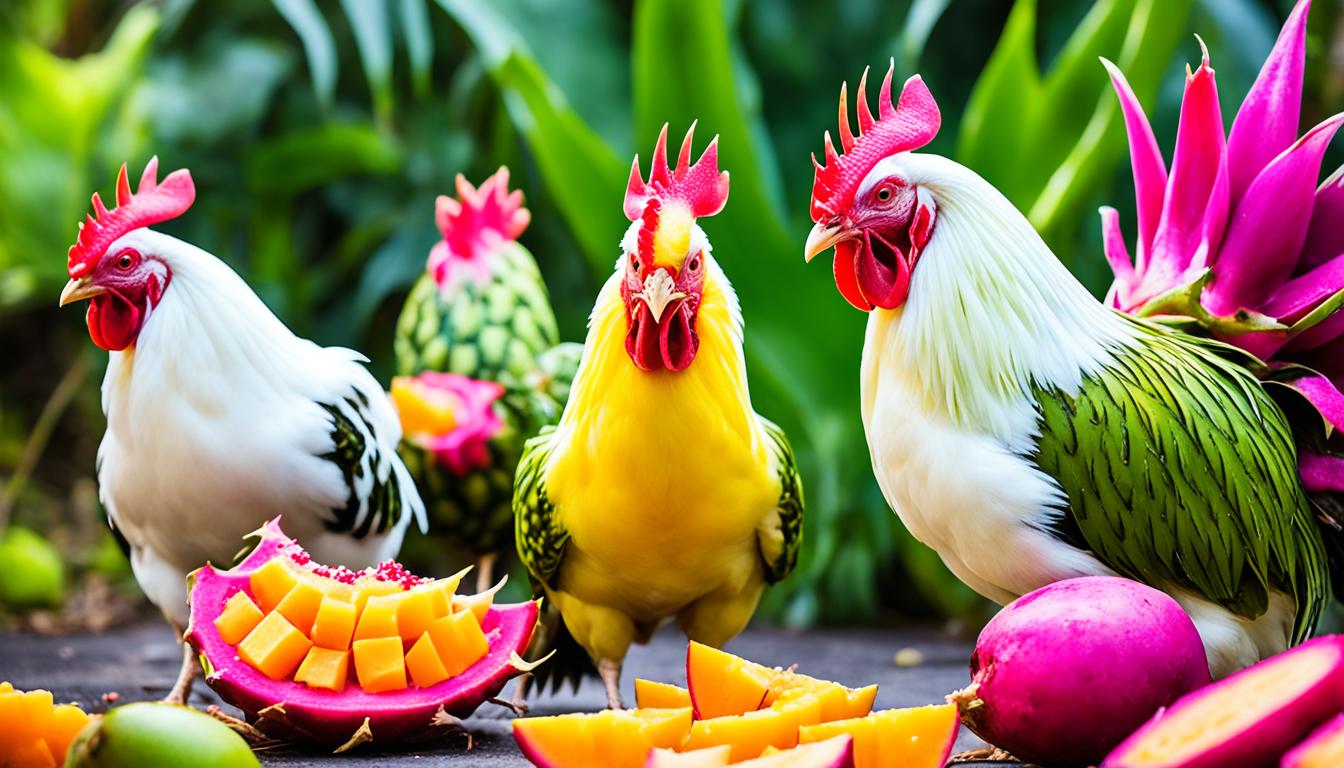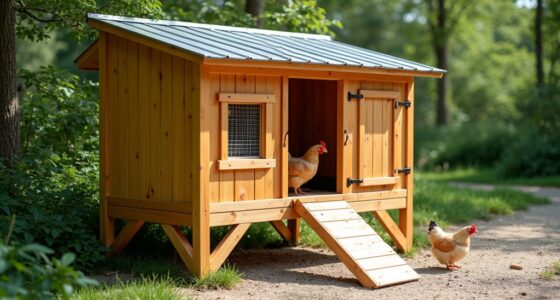To beat the heat, provide your chickens with plenty of shade using trees, shade cloths, or portable structures and make certain your coop is positioned to minimize direct sunlight. Enhance ventilation with breezy fabrics and natural airflow, and include water features or cool water sources for hydration. Keeping the environment cool and well-ventilated helps prevent heat stress and keeps your chickens comfortable. Discover more tips to ensure your flock stays cool and healthy all summer long.
Key Takeaways
- Provide ample natural or artificial shade sources like trees, shade cloths, or portable structures to protect chickens from direct sunlight.
- Orient coops and runs to minimize heat gain, and plant nearby trees for natural cooling and airflow.
- Enhance ventilation with shaded fabrics and natural breezes to promote airflow and prevent heat trapping.
- Offer water features, splash pads, and ensure constant access to cool, clean water to help chickens stay hydrated and cool.
- Adjust lighting and maintain hydration to reduce heat stress and support chicken health during hot summer days.

During hot summer days, keeping your chickens cool is vital for their health and productivity. When temperatures soar, chickens can quickly become stressed or even suffer heatstroke if you don’t take proper steps to cool them down. One of the most effective methods is to focus on natural cooling techniques, such as providing ample shade. Chickens naturally seek out shaded areas to escape the direct sun, so creating a comfortable, shaded environment helps them regulate their body temperature more easily. You can use trees, shade cloths, or even portable structures to guarantee your flock has plenty of cover during the hottest parts of the day. Shade provision not only offers immediate relief from the sun but also creates a more stable environment where temperature fluctuations are less extreme.
To maximize natural cooling, position your coop and run in a way that minimizes direct sunlight exposure. If possible, orient the coop so that it’s shaded during the hottest hours, reducing internal heat gain. Planting trees or shrubs around the coop can provide consistent shade and also help lower the surrounding air temperature through transpiration. When selecting shade options, opt for those that allow airflow, as good ventilation is key to preventing heat buildup inside the coop. You can also hang shade fabrics or tarps, but make sure they are well-ventilated and do not trap heat. The goal is to create a shaded space that remains cool and airy, encouraging chickens to rest comfortably without overheating. Incorporating natural ventilation can further enhance airflow and cooling efficiency.
In addition to shade provision, incorporating natural cooling elements like a gentle breeze or a water feature can further lower the temperature in your chicken area. Installing a fan or positioning your coop where natural airflow is strongest can help circulate cooler air. If you have space, a shallow pond or a splash pad can provide chickens with a way to cool off by bathing or standing in the water, which helps reduce their body temperature. Remember, always guarantee your chickens have access to fresh, cool water, as hydration is vital during hot weather. Keep water sources clean and plentiful, and consider adding ice or cold water in the hottest parts of the day to encourage drinking. Additionally, understanding the importance of color temperature adjustments can help you optimize lighting conditions to keep your chickens comfortable and healthy during summer heat.
Frequently Asked Questions
How Can I Tell if My Chickens Are Overheating?
You can tell if your chickens are overheating by watching for signs like open-mouth breathing, lethargy, and decreased activity. Check their chicken feathering; if it’s fluffed up or they’re panting, they’re likely too hot. Improve coop ventilation to help them cool down and prevent heat stress. Ensuring good airflow and providing shade keeps your chickens comfortable and healthy during hot weather.
What Are Natural Remedies to Reduce Heat Stress in Chickens?
You can reduce heat stress in your chickens naturally by adding herbal supplements like mint or chamomile to their water, which help cool their bodies. Providing ample shade from shade trees creates a cooler environment and protects them from direct sunlight. Ensuring proper ventilation and offering fresh, cool water also helps. These simple measures keep your chickens comfortable and healthy during hot days without resorting to chemical remedies.
Can Certain Chicken Breeds Tolerate Summer Heat Better?
Did you know that some breeds have shown 20% higher breed resilience to summer heat? Certain chicken breeds tolerate the heat better due to their feather cooling abilities and genetic traits. By choosing heat-tolerant breeds like Leghorns or Australorps, you help your flock stay comfortable during hot days. These breeds naturally adapt better, making it easier to keep your chickens healthy and stress-free in summer’s high temperatures.
How Often Should I Change Water to Keep Chickens Hydrated?
You should change your chickens’ water at least once a day to guarantee water freshness and promote proper hydration. During hot weather, check more frequently, especially if the water becomes dirty or warm. Fresh, clean water helps prevent dehydration and heat stress. Hydration tips include providing multiple water sources and placing them in shaded areas to keep water cool. Consistently offering fresh water keeps your chickens healthy and comfortable during summer heat.
Are There Specific Signs of Heat Stroke in Chickens?
You might notice your chickens acting unusually during hot days—panting, wings spread, or drooping feathers—signs of heat exhaustion symptoms. These behaviors often coincide with other heat stroke signs, like lethargy or unsteady movement. Keep an eye on your flock, especially during heatwaves, and act quickly if you see these signs. Recognizing chicken behavior changes early helps prevent heat stroke and keeps your birds healthy.
Conclusion
As summer’s heat presses down, your chickens rely on you to keep them cool. Think of their tiny bodies as delicate as your own—vulnerable to the scorching sun. With shade, fresh water, and good ventilation, you create a sanctuary from the relentless heat. Just as you seek relief on a hot day, your chickens need your care to stay comfortable. By protecting them, you make sure they stay happy and healthy, even when the thermometer rises.









